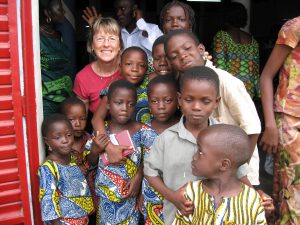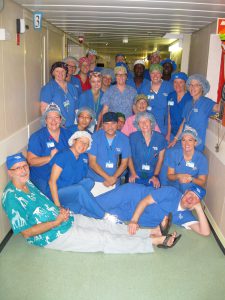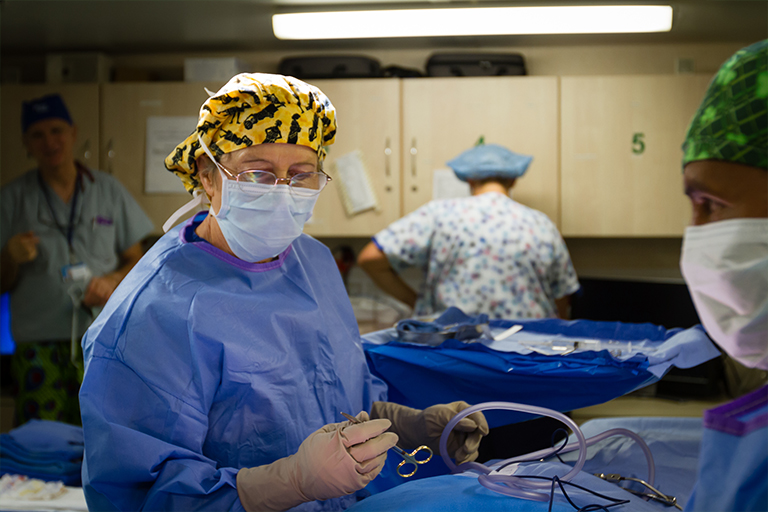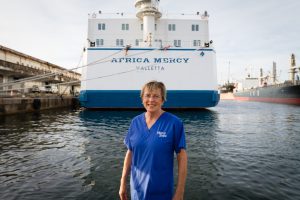By Sharon Sullivan; Photos courtesy of Mercy Ships –
Retired U.S. Army nurse Karalee Sutterlin fondly remembers watching “M*A*S*H,” the popular 1970s television series about a U.S. mobile army surgical hospital in South Korea during the Korean War.
“I was always drawn to surgery. I grew up in a tent, camping,” says Sutterlin, who served as an active duty nurse for 11 years plus nine years in the Army Reserve. “I liked the idea of surgery in a tent. It was right up my alley.”
These days Sutterlin practices her nursing skills in another somewhat unconventional workplace: aboard Mercy Ships’ Africa Mercy, the world’s largest nongovernmental hospital ship.
Sutterlin is a youthful 62-year-old with coppery wire-rimmed glasses, short blondish hair and a hankering for adventure. She leaves her Grand Junction home and retired pharmacist husband Wes for six to eight weeks each year to assist with surgeries on Africa Mercy.
The seed was planted in 1989, toward the beginning of Sutterlin’s 20-year military career, during a reserve weekend in California when she visited a humanitarian hospital ship for the first time. “Someday I’m going to work on that ship,” she remembers thinking.
Two decades later, after she retired from the military, Sutterlin revisited the idea. She was attending a church service in Grand Junction when she heard about an upcoming medical hospital ship mission. “I hadn’t thought about it in 20 years because I was tied to the military. I didn’t have the freedom. So it was amazing. I was free, I was available,” Sutterlin recalls. She applied.
Sutterlin’s first Mercy Ships trip in 2008, to Liberia in West Africa, was challenging. Every significant building was destroyed, as a result of the civil war, Sutterlin says. “The country was in shambles; schools were shut down.”
Nor was she accustomed to communal life. On any given day, 400 volunteers live and work on the ship. Sutterlin found herself sharing a room and a bathroom with six other women.
Sutterlin also remembers working long hours without a break and not being able to simply walk off the ship whenever she wanted. “There are rules and regulations for safety,” Sutterlin says. You must have a buddy, or be in a group, before you can leave the ship.
“All of a sudden I had jumped into this all-new world,” she recalls. “I learned a lot about myself. I needed to redefine my purpose. It’s not about me; it’s about service. You find out what you’re made up of.” Eight years and six countries later — including stints in Sierra Leone, Benin, Guinea, Congo and twice to Madagascar — Sutterlin says she learned to spot “first-timers” and give support and encouragement when needed.
Mercy Ships was founded back in 1978 by Don Stephens, who grew up in Olathe, Colorado, and his wife, Deyon, from Grand Junction. Their dream was to help people around the world where medical care is dismal, or nonexistent. Since then, Mercy Ships, using up to three ships at a time, has provided free medical care for people in 56 nations, including Gambia, Ghana, Ivory Coast, Senegal, South Africa and Togo.
Former Mercy hospital ships were sold or retired, leaving Africa Mercy as the sole ship focusing on serving people of West Africa. The hospital ship remains in the country for 10 months, long enough to do follow-up care and train local health care providers, Deyon Stephens says.
LIFE-CHANGING SURGERIES
Sutterlin assists with all kinds of life-changing procedures, including cataract surgery, which is a fairly straightforward operation that restores vision in patients who were blinded by the disease. Most of the patients have never been in a hospital before and are often scared, Sutterlin says.
 She remembers a terrified 14-year-old girl whom she comforted before and during surgery. Sutterlin rejoiced with the girl and her mother at the postoperative visit a week later when the child’s bandages were removed and she could see again. She recalls another patient who lost his vision 27 years earlier, and was able to return to his truck-driving job after healing from his surgery.
She remembers a terrified 14-year-old girl whom she comforted before and during surgery. Sutterlin rejoiced with the girl and her mother at the postoperative visit a week later when the child’s bandages were removed and she could see again. She recalls another patient who lost his vision 27 years earlier, and was able to return to his truck-driving job after healing from his surgery.
When Africa Mercy docks at a major port city, thousands of cars line the highways leading to the floating hospital. Desperate individuals suffering from huge, disfiguring facial tumors and parents with children who have cleft palates or severe bowlegs come seeking treatment for debilitating conditions that are often easily fixable where there is medical care.
For example, repairing a child’s cleft palate is a quick, simple surgery that allows the patient to speak and eat properly, Sutterlin says. “We do a lot of plastic surgeries for people with burn scars,” she added. Both children and adults often fall into open cooking fires, Sutterlin says.
Particularly heart wrenching for Sutterlin are the women who seek relief from uncontrollable bladders. Tissue injuries caused by sexual assaults that occurred during war, or from pregnancies that occurred at too young an age cause women great pain and discomfort, as well as emotional distress. “They smell so bad because they can’t control their bladder,” Sutterlin says. “Their clothes are tarnished; no one wants them around. Their husbands throw them out. They live outside or in shacks.”
After the restorative surgery, a woman is given a new dress and headdress. “For these women it’s a total miracle,” Sutterlin says. “They’re given a whole new life.
“That’s what keeps you going back: the smiles on the faces, the gratitude,” says Sutterlin, who worked as a civilian nurse for seven years. “It’s not the same satisfaction in a U.S. hospital where you don’t know the back story or see the follow-up. You don’t necessarily see how you really made a difference.”
Sutterlin assisted with many maxillofacial tumor surgeries aboard Africa Mercy. Surgeons remove humongous facial tumors that cause unrelenting pain and discomfort for victims, as well as severe emotional trauma. Those afflicted with the disfiguring tumors are often considered cursed and are shunned, hidden away or abandoned.
A Madagascar man named Sambany had a facial tumor weighing more than 16 pounds, which is equivalent to the size of two heads. His tumor was so heavy he was forced to support the abnormal growth with his hands when he walked. At night, he couldn’t sleep.
While listening to the radio one day (the radio being his constant companion), Sambany heard about a hospital ship offering free medical care. Family members sold a rice field to pay for travel expenses to bring Sambany to Africa Mercy. Five people took turns carrying him on their backs for two days.
Sutterlin’s roommate assisted with the surgery to remove Sambany’s tumor in 2015. He lost more than twice his body’s volume of blood during the successful 12-hour surgery. (The blood was replaced by the medical team, and now the blood of 17 people from six nations runs through Sambany’s veins.)
Although the tumors removed aboard Africa Mercy are benign, they eventually obstruct a person’s ability to breathe and eat. Huge, disfiguring tumors like these are not seen in the United States where lumps are typically removed before they grow so large.
Mercy Ships does not treat cancerous tumors because there are no means of following up over the long term, Sutterlin says. “We cannot do everything that’s out there. It’s like a triage: We do what we can.”
Mercy Ships performed 82,000 life-changing operations, including orthopedic procedures, plastic surgeries, straightening crossed eyes, maxillofacial reconstruction, and vaginal fistula repair. Additionally, more than 390,000 dental procedures were performed on 147,000 patients.
FREE TIME
It’s not all work and no play for Mercy Ships volunteers. Crew members go into villages to sample the local cuisine or explore the countryside. Sutterlin is known among her shipmates as a “tour adventure planner,” for her interest in planning outings. “I always try and organize something off the ship,” she says. “You have to plan ahead to do major hikes.”

The crew on the Africa Mercy ship becomes like family, all working together to benefit people in West Africa.
In the Congo, she and a few colleagues traveled four hours inland, following an interpreter-guide into the bush country. “We saw two kids who caught two frogs for lunch for the family. They were proud,” Sutterlin recalls. They observed villagers going about their daily tasks of harvesting fruit and fishing with women walking while balancing baskets of goods on their heads, and men navigating wooden canoes through waterways.
Sutterlin has been invited to tribal dances where villagers wear their finest clothing, including elaborate headdresses. In Madagascar, Sutterlin and some friends traveled by boat for three hours to a lemur reserve where, she says, there are men who speak the language of lemurs.
There’s also a lot to do on board the ship, like attend live music events, watch movies or participate in one of the many different types of competitions, Sutterlin says. There is a Toastmasters club, Bible study groups, and various classes, such as French lessons, she adds.
Computer stations on board allow crew members to check Facebook, email or surf the internet. Volunteers can also call home or browse the huge ship library. Surgeons give weekly presentations about their specialties so crew members know what’s going on in other parts of the ship.
The entire crew, including the medical team, cooks, teachers and office workers, pay for their own room and board while on the ship.
The hospital ship’s chief medical officer, Gary Parker, has spent 30 years living aboard Mercy Ships. He met his wife on board and they raised their children there.
Sutterlin says she made friends from around the world on Africa Mercy, several of whom visited her and Wes in their Grand Junction home. Volunteers often coordinate their schedules with one another so that they’ll be on the ship at the same time.
“It’s total family,” Sutterlin says: all on a ship; all serving others; all bringing life-changing surgeries to the people of West Africa.
Freelance writer Sharon Sullivan is based in Grand Junction and enjoys exploring what makes the Grand Valley the special and unique place it is.


